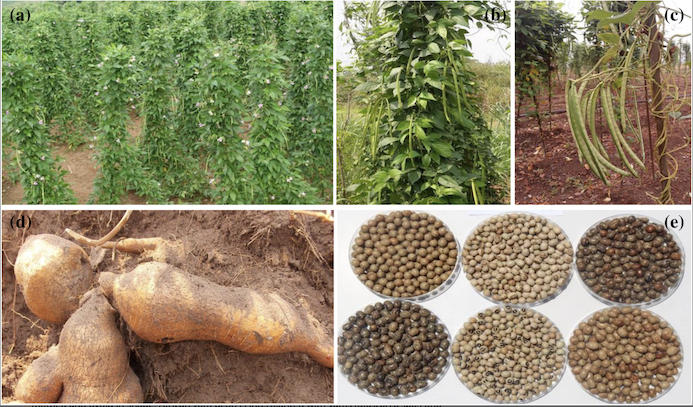African scientists are using the tools of biotechnology to boost the climate-resiliency and yields of the high-protein African yam bean.
Scientists at the International Institute of Tropical Agriculture (IITA) Genetic Resource Center are employing marker-assisted selection and other biotech tools, as well as conventional plant breeding, to add traits like shorter cooking time, high yield, disease resistance and early maturity to the yam bean.
The improved crop will be capable of providing food and nutrition security, income generation for farmers and employment for women and youth, researchers said.
“The application of biotechnology on the African yam bean, whose high protein content makes it a better source of food than corn, sweet potatoes or cassava, will lead to increased yields, which in time will help resource-poor rural and semi-rural communities in west Africa achieve resilience to climate stresses,” said Gideon Enofe, a Nigerian research scientist.
He noted that promotion of soil fertility through nitrogen fixation is one of the yam bean’s most important virtues. Many smallholder farmers in Africa struggle with soil fertility issues and cannot afford synthetic fertilizers or source livestock manure.
“Local varieties of the crop are already available, but the improved varieties will be available in one to three years’ time,” Dr. Oyatomi Olaniyi, seed bank manager at the Center, told the Alliance for Science.
Experts in Nigeria’s agriculture and food sector last year said that yam bean could be used to alleviate malnutrition during food scarcity and could fill food, nutrition and livelihood gaps if policies are put in place to establish sustainable value chains and export markets for the legume.
The African yam bean produces two valuable products — edible seeds and tubers — that are important in most indigenous African food cultures. It is especially popular in Nigeria, Ethiopia, Kenya, Malawi and central Africa.
In a recent paper, researchers from IITA and Nigeria’s Covenant University and the University of Ibadan noted that the biotechnology-assisted improvement of the African yam bean is imperative to develop crops that deliver enhanced yields to smallholder farmers, resistance to diseases such as leaf mosaic and powdery mildew and reduced cooking time.

Genome editing, proteomics and bioinformatics — tools previously used to improve other popular legume crops such as soya and cowpeas in West Africa — could be used on the yam bean, the researchers found.
Several West African research scientists and plant breeders contend that genetic improvement of the crop will help diversify sub-Saharan Africa’s food base and lead to the sustainability of farming systems in many parts of west and central Africa.
In another paper, researchers stated that enhancing the African yam bean through robust innovative approaches, including accelerated research, would support its use as a climate-smart crop to cushion the impact of climate change on vulnerable groups in Nigeria.
In West Africa, many research centers have already introduced the crop into their cropping systems.
IITA’s Genetic Resources Centre in Idaban, Nigeria, partnered with farmers and researchers last year to identify 11 accessions (varieties) of African yam bean that could be improved upon.
Dr. Morufat Balogun, a geneticist with IITA, was quoted as having said the partnership was part of the Institute’s efforts to make the African yam bean a crop of value.
At present, the Alliance for Accelerated Crop Improvement in Africa (ACACIA) is undertaking a genome sequencing of the crop, which the WE LEAD food program said may be the solution to Africa’s growing food insecurity problem.
Image: Yam bean under cultivation. Photo: Society of Underutilized African Yam Bean
